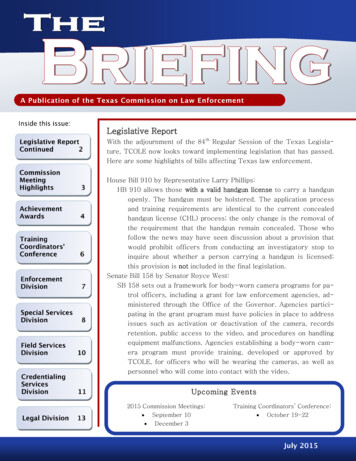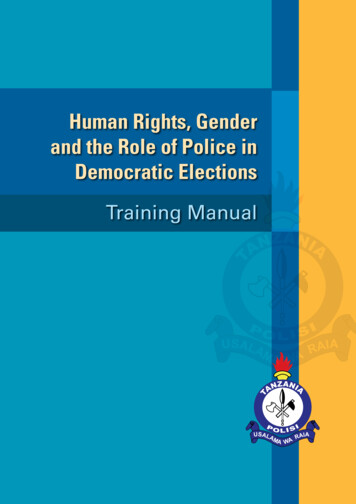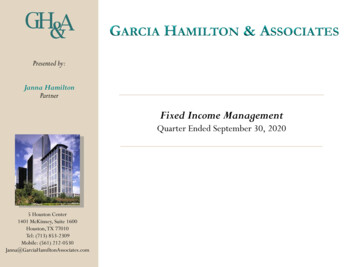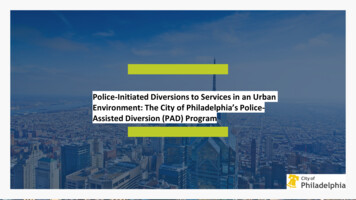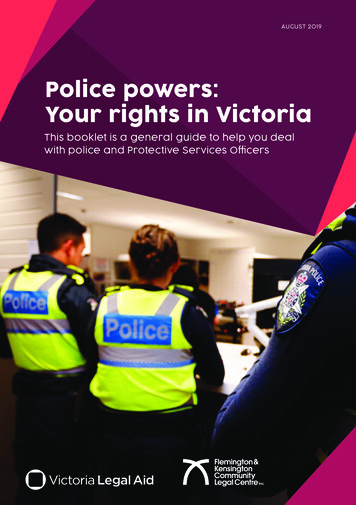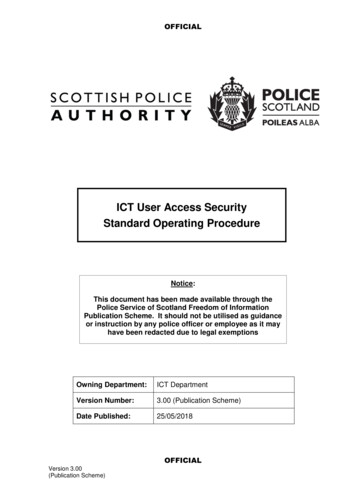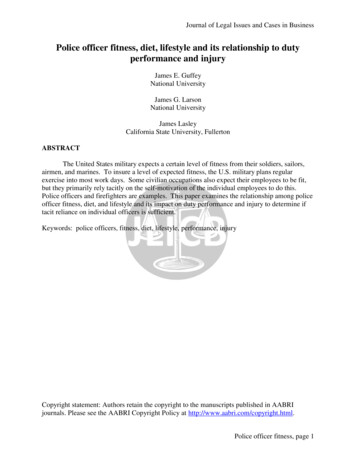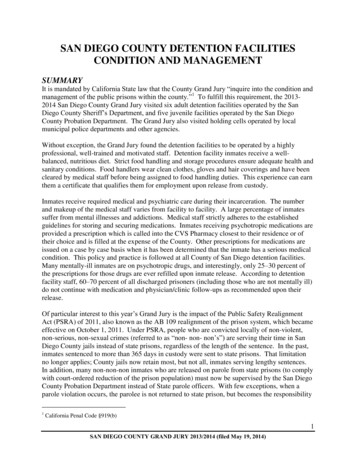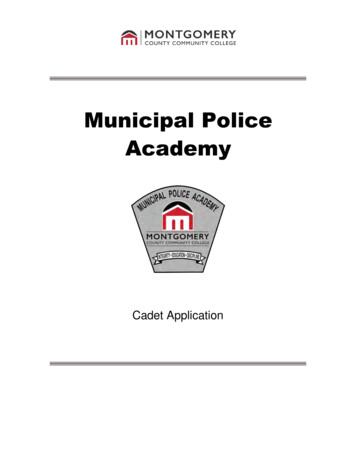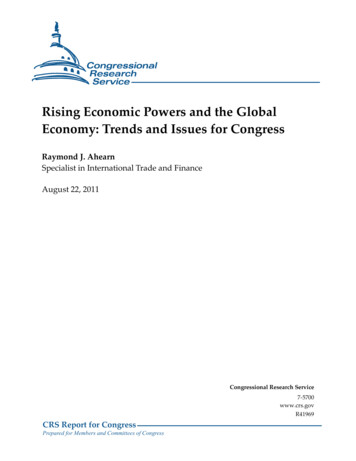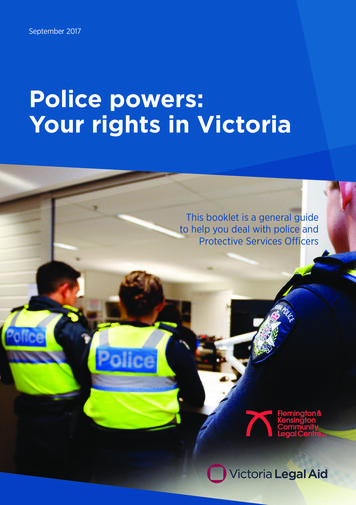
Transcription
September 2017Police powers:Your rights in VictoriaThis booklet is a general guideto help you deal with police andProtective Services Officers
Do you need this booklet in a different format?Please ring us on (03) 9269 0234 and ask for Publications so we can talk with you about whatyou need.Produced by Victoria Legal AidVictoria Legal Aid570 Bourke StreetMelbourne VIC 3000For help with legal problems, call Legal Help on 1300 792 387For business queries, call (03) 9269 0234 2017 Victoria Legal Aid. This work is licensed under a Creative Commons Attribution 4.0 . You are free to re-use the work under that licence,on the condition that you credit Victoria Legal Aid as author, indicate if changes were madeand comply with other licence terms. The licence does not apply to any images, photographs orbranding including the Victoria Legal Aid logo.Cover image: Copyright Victoria Police. Not to be used or reproduced without permissionDisclaimer: The material in this publication is a general guide only. It is not legal advice. If youneed to, please get legal advice about your own particular situation.Changes to the law: The law changes all the time. To check for changes, you can: call the Victoria Legal Aid Legal Help phone-line on 1300 792 387 visit Victoria Legal Aid’s website at www.legalaid.vic.gov.au.ISBN 978 1 921949 04 3Printed on recycled paper consisting of 50% post consumer waste and 50% certified fibre fromcontrolled wood sources.
ContentsAbout this booklet1What do these words mean?2Name and address4Searches6Arrest and being held in custody11Interviews and statements14Photos, ID parades, fingerprints and body samples18Being released from custody22Cognitive disability and mental illness24Move on powers27Traffic offences28Fines30Protective Services Officers32Making a complaint34Where to get help37Contents
Victoria Legal AidVictoria Legal Aid is a government funded agency set up to ensure that people whocannot afford to pay for a private lawyer can get help with their legal problems. Weprovide free information for all Victorians, family dispute resolution for disadvantagedfamilies, provide lawyers on duty in most courts and tribunals in Victoria, and fundlegal representation for people who meet our eligibility criteria. We help Victorianpeople with legal problems about criminal matters, family breakdown, child protection,family violence, child support, migration, social security, mental health, discrimination,guardianship and administration, tenancy and debt.Flemington and Kensington Community Legal Centre (FKCLC)FKCLC is one of more than 50 community legal centres in Victoria. The FKCLC providesgeneralist legal advice on a free and confidential basis to people in the Flemington andKensington area. It also runs a state-wide, specialist police complaints clinic. As partof the overall philosophy of community legal centres, FKCLC delivers community legaleducation and conducts law reform and social justice campaigns. FKCLC is committed tothe principles of human rights, social justice, equity and community participation.The FKCLC works to achieve the following outcomes: that people in the local community have equal access to justicethat people are aware of, and can assert, their legal rightsthat the process of changing laws is responsive to changes in the communitythat any given laws have the same impact on people regardless of their incomeor power that people understand and respect the rights and responsibilities of others inthe community.
About this bookletWhat this booklet coversThis booklet is a general guide to help you when you deal with the police. It focuseson what police can and cannot do. The booklet covers things like arrest, being held incustody and searches. It also includes information about Protective Services Officers.When dealing with the police and Protective Services Officers, it is important toremember that you have rights under the Victorian Charter of Human Rights andResponsibilities Act 2006. See ‘Human rights’ on page 36.Getting more helpThis booklet gives general information, not legal advice. We have put the contact detailsof helpful organisations in the ‘Where to get help’ section on page 37.About this booklet1
What do these words mean?In every section of this booklet we highlight legal words in bold when they first appear.The definitions for these words are below.appeal – an application to a higher court, tribunal or government department for adecision to be reversedapprehend – when the police hold you (you are not free to leave)arrest – when the police hold you in custody because they think you have broken thelawbail – a promise to go to court to face charges on a certain date. Bail may haveconditions, like reporting to the police or living at a certain placebail justice – a person who comes to the police station and can give or refuse you bailbreach – to break a law or court orderbreach of peace – to cause a disturbance to the publiccharge – the offence the police say you have committedcharge sheet – a document that lists all the offences a person is charged with.consent – when you willingly agree to somethingcourt order – where the court tells you to do something (like come to court again orwrite an apology). It can also be a document that sets out the penalty if you are foundguilty of breaking the lawcriminal record – a record of the crimes a person has been previously found guilty ofand the punishment they receivedcustody – under arrest (not free to leave)evidence – information (documents or witnesses) used by the court or tribunal to makea decisionIndependent Person – an adult who must be with you during police questioning if youare under 18 and your parents or guardian can’t be thereIndependent Third Person – a trained person who must be with you during policequestioning if you have an intellectual disability or mental illness, to help you understandwhat’s happeningindictable offence – a serious offence which may be heard in the County or SupremeCourt. Many indictable offences can be heard in the Magistrates’ Court if you and themagistrate agree to this2
magistrate – a person in the Magistrates’ or Children’s Court who hears cases anddecides whether someone is guilty or not, and what sentence they getnotice to appear – a document that tells you to go to court on a certain date when thepolice suspect you of breaking the lawoffence – an action the law says is wrong (illegal). See chargepenalty – a punishment for breaking the lawpenalty unit – used to calculate the amount of a finereasonable – acting in a way which is appropriate (not excessive)seize – when the police take items as evidence (from a home or car)sentence – the punishment the court gives for the offence/sserve – the legal delivery of a documentstatement – a signed document of what you say happened, which can be used in courtsubpoena – a document that says you must go to court or give the court documents ona certain datesummary offence – a less serious offence which is usually heard in the Magistrates’ orChildren’s Courtsummons – a document that says when and where to go to courtsurety – a person who promises money or property to the court to make sure youattend court. If you do not, that person will usually lose their money or propertysuspect – a person thought to be guilty of a crime or offenceundertaking – a promise to the court to do or not do certain thingswarrant – a court document authorising what the police or sheriff can do, such as toarrest someone or search propertyWhat do these words mean?witness – a person who gives evidence in writing or in person at the court. Also a personwho is present when someone signs a document and confirms that the signature isgenuine by adding their own signature3
Name and addressDo I have to give my name and address?You must give your name and address in all of the circumstances below. It is anoffence to give a false name and address.In generalA police officer can only ask you to give your name and address if they have areasonable belief you: have committed an offence are about to commit an offence.For example, a police officer can ask you for your age, name and address if they have areasonable belief that you bought alcohol and you are under 18.The police officer must tell you what offence they think you have committed.DrivingThe police officer may signal for you to stop driving. You must stop and show the policeofficer your licence.Helping with an investigationThe police officer may believe you have information that could help them investigatean indictable offence. You must give the police officer your name and address if asked.The police officer must tell you what offence they think you will be able to help theminvestigate.Can I get the name of the police officer?Yes. The police officer must give you their details if you ask. Ask for their name, theirrank and the police station where they work. You can also ask for these details in writing.This information may be useful later. For example, you may want to complain about thepolice officer or report them.The police officer can be fined for not giving you their name, rank and police station.You need to complain for this to happen. A lawyer can help you do this. For moreinformation about making a complaint, see ‘Making a complaint’ on page 34.4
Do I have to answer any other questions?Police may want to ask you more questions. They may start by questioning you as awitness. Then they may question you as a suspect. The police must tell you if they thinkyou are a suspect in a criminal offence. They must tell you your rights before they askyou questions. See ‘Interviews and statements’ on page 14.In either case, you do not have to answer any other questions. If the police officer tellsyou that you are breaking the law by refusing them information, ask to speak witha lawyer.However, if someone was using your vehicle and the police officer asks you for thatperson’s name, you have to give it. If you don’t, the police could charge you with asummary offence. If the magistrate finds you guilty at court, you could lose your licencefor two years or more.The police officer may use anything you say to them to arrest or charge you. Thereis no such thing as speaking ‘off the record’. The police could use what you say asevidence in court to show that you broke the law.Can a police officer ask for my phone number and do I have to give it?Yes, they can ask. You do not have to give it to them.Name and address5
SearchesCan a police officer search me?In general, a police officer can search you if they have: a warrant arrested you.If a police officer searches you, they must make a written record that they did thesearch. You can ask for a copy of the record at the time or later. This is free if you ask forthe record within one year of the search.When can a police officer search me without a warrant?Searches by consentIf the police officer does not have a warrant or the authority to search you, they mightask you if you will let them search you. This is called a ‘search by consent’. You cansay no. If you say yes, the police officer should get your agreement in writing. You cancomplain if this does not happen. See ‘Making a complaint’ on page 34.Searches in a ‘public place’The police officer does not need a warrant to search you in a public place if theyreasonably suspect you: have illegal drugshave things that can explode or ignitehave guns or weapons like knives, imitation guns, knuckle-dusters or nunchakusare in an area where a lot of violent crime happens (they can use this fact to showthey have reasonable grounds to search you) have something that could be used to make graffiti, for example, spray paint, agouging tool or even a texta.A public place includes: a shopin or around a train station, or on public transport (buses, trams or trains)a schoola churcha hospital or welfare centre, like the Salvation Armyan open space, like Federation Square.The police officer can search anything you are carrying and the car you are in.They can search your car even if you are not in it.6
Note: to search you for a graffiti offence, the police officer must reasonably believeyou are 14 or older. You must also be on or near public transport property ortrespassing on someone else’s property.Searches in public ‘designated areas’The police can search people for weapons in public areas which are ‘designated areas’.Protective Services Officers may be able to search you too. See ‘Protective ServicesOfficers’ on page 32.A senior police officer can make a public area into a designated area if the area: has had two or more events of violence or disorder in the last 12 months is a regular trouble spot such as King Street in the city has had events or demonstrations that have been violent.Police have a lot of search powers within the designated areas: they do not need a warrant they do not need to have any reasonable grounds to suspect you are carryinga weapon they can search you, your bags or your car for weapons they can do searches in these areas for up to 12 hours.The police should tell people that the public area has become a designated area. Theyshould publish this in a local newspaper. They do not have to do this if they have made apublic area into a designated area at short notice.Before searching anyone, the police officer must give the person a written search notice.This will say that: the area has become a designated areayou or your vehicle are in that designated areathe police have the power to search youit is an offence to stop the police searching you.If a police officer asks to search you because you are in a designated area, you must letthem. It is an offence to resist. You can contact Victoria Legal Aid or a community legalcentre if you need help afterwards, whether or not the police found a weapon on you.See ‘Where to get help’ on page 37.Searches7
Searches on private propertyA police officer usually needs a warrant to enter and search private property such asyour home.The police officer may enter your property without a warrant when: you agree to let the police officer in the police officer has a reasonable belief that someone will commit or hascommitted a serious offence, and the police officer needs to go into the property toarrest that person the police officer needs to stop a breach of peace, for example, a fight someone inside the property has breached an intervention order or a family violencesafety notice someone has not followed a direction given by the police for a familyviolence matter the police officer has a reasonable belief that someone has assaulted or threatenedto assault a family member the police officer is chasing someone who has escaped from prison or custodyIf the police show up at my house, what should I say to them?You can ask to see a warrant.If they do not have one, you can let them search your house if you give them permission.Remember, there are times when the police can search without a warrant. See theprevious section.Under 18sGraffiti – the police officer can only give you a pat-down search if they aresearching you for a graffiti offence. Police cannot search someone under 14.Alcohol – a police officer cannot search you for alcohol without your permission butif they see you with alcohol they can take it from you.Chroming – a police officer can search you if they suspect you are chroming(sniffing things like spray paint or glue). It is not a crime to chrome but the policeofficer can stop you. They may take you somewhere safe if they think you willhurt yourself.8
What sort of searches can a police officer do?Pat-down searchThis is when the police officer uses their hands to feel over the outside of your clothes.The police officer can: search you in public or on private property ask you to empty your pockets or remove your jacket or jumper ask you to show them something they believe is a weapon. The police can charge youand fine you if you refuse use a metal detector to look for something they reasonably suspect is a weapon.The police officer who does the search must: be the same sex as you (unless this is not reasonably possible to arrange) make a written record of the search give you a receipt if they seize any of your things, including drugs. See page 10 formore information about having your things seized.Strip searchThis is when the police officer removes all of your clothing and searches you. The policeofficer will usually do a strip search when they are looking for something they could notfind in a pat-down search.The police officer can only do a strip search in a private place. This is usually at apolice station.The police officer must follow the same rules as for a pat-down search. The police officermust also make sure you have a parent or guardian with you during the search, if you areunder 18 or have a cognitive disability.The police officer will not have to do this if it is not ‘practicable’ to get one of these peopleto be with you. In this case, they can get someone else to watch over the search, includinganother police officer. The law does not say what ‘practicable’ means. It could mean thepolice officer believes it would take too long for the parent or guardian to get there.Also, if the search is in a designated area and there are serious circumstances that meana police officer cannot wait for a parent, guardian or Independent Person, police may useanother person to watch the search.Internal body searchThis means searching inside your body. If you agree to it, only a doctor can do the search.The doctor must be the same sex as you.SearchesHaving an internal body search means you are having a forensic procedure done.See ‘What is a body sample?’ in ‘Photos, ID parades, fingerprints and body samples’ onpage 20.9
You do not have to agree to an internal body search. The police must get a court orderto do the search if you refuse.In all cases: talk to a lawyer as soon as you can if you are not happy with how thesearch was done. See ‘Where to get help’ on page 37.What should I do if a police officer searches me?Before the search beginsAsk the police officer why they want to search you – they must give you a reason. Dothis even if the police officer has a warrant or the authority to search you.While the search happensStay calm. Searches can be fast and confusing. If the police officer has the right tosearch you, you must let them do their job. The police can charge you with ‘hindering’police if the officer is allowed to search you and you tried to stop it happening.What if the police officer hurts me?The police officer can only use reasonable force when they search you. For example, thepolice officer should not be rough with you if you are co-operating with the search. Youcan make a complaint if you feel that the police officer was too rough. See ‘Making acomplaint’ on page 34.What if the police officer seizes my things in a search?A police officer can seize items they find on you if these things are: illegal to have evidence in relation to a crime.The police officer must give you a written list of what they have taken. You must bothsign this list.How do I get my things back?The easiest way to get your things back is to talk with the police conducting theinvestigation.The police must give you back your things when the items are not: potential evidence of an offence proceeds of crime, for example, money made from selling illegal drugs illegal things, like weapons.If the police do not return your things, get legal help. See ‘Where to get help’ on page37. You may also want to make a complaint to the Independent Broad-based Anticorruption Commission. See ‘Making a complaint’ on page 34.10
Arrest and being held in custodyWhat does arrest mean?When you are under arrest, the police officer holds you in custody because they believeyou have broken the law. You are not free to leave.The police officer must tell you: that you are under arrest the reason they are arresting you.When can I be arrested?A police officer can arrest you when they: reasonably believe you have broken a law have a warrant for your arrest reasonably believe you are a risk to a family member.You should always ask the police officer, ‘Am I under arrest?’ and ‘Why am Iunder arrest?’Note, children under the age of 10 cannot be charged with a criminal offence.Do I have to go with the police officer?You must go with the police officer if you are under arrest or apprehended.If a police officer asks you to go with them without arresting you, you do not have to go.You can complain if the police officer tries to arrest you without a reason. See ‘Making acomplaint’ on page 34.The police can charge you with ‘resisting arrest’ if you try to stop them arresting you.The police officer can also use reasonable force to arrest you if you refuse to acceptyour arrest. The police officer can only do this if they had the right to arrest you in thefirst place.You can complain if the police officer uses unreasonable force. See ‘Making a complaint’on page 34.Can a police officer arrest me if he or she is off duty?Yes.Arrest and being held in custodyIf I am under arrest, what will happen if I do not go with the police officer?11
Should I go to the station if a police officer wants to give me a breath test ordrug test there?You are not under arrest, but if you don’t go the police officer will charge you with theoffence of refusing to undergo the test. You will lose your licence for two years or more.What does ‘being held in custody’ mean?After arrest, the police will take you into custody. This means the police officer will takeyou to a police station, custody centre or the police cells at court. You may have to travelin a police vehicle to get there. The police officer may handcuff you.What happens when I am in custody?The police officer may: ask you for your name and addressask you to give a statementinterview youfingerprint yousearch youask to take your photograph (you can refuse)charge youcharge you and give you bail.Can I tell someone I am in custody?You have the right to make two phone calls: one to a lawyer one to a friend or relative.The police officer must give you a private space to use the phone. A private space iswhere the police officer cannot hear you.The police officer might not let you call anyone if: they brought you into custody for a drink or drug driving matter the police officer reasonably believes the phone call may: help another person involved in the offence get away lose, change or destroy evidence put other people in danger.How long can the police keep me in custody?The police can only keep you in custody for a ‘reasonable time’ before they charge you.The law does not say what a reasonable time is. This depends on the seriousness of theoffence and how long it takes the police to interview you.12
If you think the police have kept you in custody for too long: ask when they are going to charge you or release you ask to phone a lawyer make a complaint later. See ‘Making a complaint’ on page 34.What happens to my things when I go into custody?The police will take your things (personal property) if the police are holding you in apolice cell. They must list all property on a ‘property sheet’. They will then ask you tosign the sheet to show that you agree with them about what property has been taken.The police must return your property when they release you from custody. They do nothave to do this if they are keeping your property as evidence or destroyed it because itwas illegal for you to have, for example, drugs or weapons. See page 10 for seizing rights.The police have a warrant out for me. When they execute it can they take meto jail?The police execute it by arresting you. They can keep you in custody until you go tocourt, or they can grant you bail from the police station.Getting help when in custodyInterpretersIf you do not understand English very well, you can ask the police officer for aninterpreter to help explain things. The interpreter must be qualified (not just a relative).You do not have to pay for this. The police will pay.Aboriginal and Torres Strait Islander AustraliansThe police must tell the Victorian Aboriginal Legal Service (VALS) that they are holdingyou in custody. A client services officer from VALS will speak to you and offer supportand advice. You can choose what parts of the advice you want to follow.Health needs and drug addictionYou can see a doctor if you need to. Ask the police officer to organise this. The policeofficer can call the Custodial Risk Management Unit. A nurse from the unit may be ableto help you with medicine or treatment.The police should help you get your medicine if you have a prescription. This includesprescriptions for methadone and buprenorphine (bupe).Ask for your medication or medical help before an interview starts. You might need thisto get through the interview.Arrest and being held in custodyThe police must also contact an Aboriginal Community Justice Panel (if there is onenearby). The Aboriginal Community Justice Panel works with government agencies andpolice officers to make sure Aboriginal and Torres Strait Islander people are looked afterproperly when dealing with the police, courts or prisons. A panel member can give yousupport and advice. The police may release you into the panel member’s care if the caseis not too serious.13
Interviews and statementsInterviewsDo I give the interview straight after I am arrested?The police can force you to sit in an interview with them but you do not have to answerany questions other than giving your name and address.What is the police ‘caution’?The police officer must read out your rights before they begin the interview. This iscalled a caution.The caution used by the police officer is:I must inform you that you do not have to say or do anything but anything you sayor do may be given in evidence.Do you understand that?I must also inform you of the following rights: You may communicate with or attempt to communicate with a friend or a relativeto inform that person of your whereabouts You may communicate with or attempt to communicate with a legal practitioner.These rights are for your protection. It is a good idea to use them. For example, tell thepolice officer if you want to call a friend, relative or lawyer. Do this as soon as the policeofficer cautions you and don’t start talking to the police until you’ve made the call.Ask the police officer to explain your rights in more detail if you don’t understand whatthey are saying.Are the caution and interview recorded?Yes. Police must record the caution and interview. Tell them if you don’t want to befilmed during the interview. They can turn the camera away to record your voice only.If the police are questioning you, and they want to use this information as evidenceagainst you in court, the police officer must record any questions they ask you as well asyour answers.Note: for a summary offence, the police officer does not have to record what yousay for it to be used as evidence. Summary offences include things such as minordriving offences, begging, offensive behaviour or being drunk in a public place. Thepolice officer can write down questions they ask you and your answers. They canuse this information as evidence against you in court.14
Should I answer the questions in the interview?You do not have to answer any questions in the interview, and can say, ‘No comment’ orstay silent after the caution. If you do answer some questions, you can always go backto answering, ‘No comment’ at any time.Do not lie in an interview. The police can use any lies you tell to try to prove that you arelying about other things as well.Sometimes if you tell the police things to show your innocence, this may make adifference as to whether the police decide to charge you. This may be a risky option,as police are unlikely to tell you the full story about what they think you did until theend of the interview. The police will ask you questions from their angle. They might notrecognise your point of view. That is why the police have to caution you.Get legal advice and explain your side of the story to a lawyer before giving an interview.If you are in custody, always get legal advice before giving an interview.Do I get a copy of the interview?Yes. The police officer must give you a copy of the interview. This copy is important foryour lawyer. Keep it safe.Do the police know what penalties I will get if I go to court?It is the magistrate or judge who decides what your penalty is.It is best to talk to a lawyer about penalties.What happens after the police have interviewed me?The police may:I have been interviewed. The police said they would charge me but I have not receivedanything in the mail. What do I do now?If you are wanting an update on the investigation, it is best to call Victoria Legal Aid oryour lawyer to discuss this before you call the police.Interviews and statements release you from custody without charging you release you from custody but charge you later. The police will serve your chargesthrough a summons release you from custody and give you a notice to appear. You will have to go tocourt within 14 days charge you but release you on bail charge you and keep you in custody until the court is open for a magistrate todecide if you will be released on bail. See ‘Being released from custody’ on page 22.15
The police want to interview me. If I refuse to go in for an interview can they comearound to my house and arrest me?They will not arrest you as a standard procedure, but they do have the right to arrestyou to do the interview.StatementsWhat is a statement?A statement is a written and signed document to the police. It is your version of events.You may be asked to make a statement as a witness or a suspect.Do I have to make a statement if I a
Arrest and being held in custody 11 Interviews and statements 14 Photos, ID parades, fingerprints and body samples 18 Being released from custody 22 Cognitive disability and mental illness 24 Move on powers 27 Traffic offences 28 Fines 30 Protective Services Office
